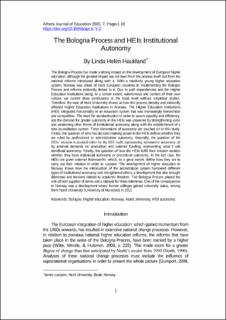| dc.contributor.author | Haukland, Linda Helén | |
| dc.date.accessioned | 2020-09-14T07:56:59Z | |
| dc.date.available | 2020-09-14T07:56:59Z | |
| dc.date.created | 2020-01-30T11:44:37Z | |
| dc.date.issued | 2020 | |
| dc.identifier.citation | Haukland, L. H. (2020). The Bologna Process and HEIs Institutional Autonomy. Athens Journal of Education (AJE), 7(4), 365-384. doi: | en_US |
| dc.identifier.issn | 2407-9898 | |
| dc.identifier.uri | https://hdl.handle.net/11250/2677542 | |
| dc.description.abstract | The Bologna Process has made a strong impact on the development of European higher education, although the greatest impact has not been from the process itself, but from the national reforms introduced along with it. With a relatively young higher education system, Norway was ahead of most European countries in implementing the Bologna Process and reforms indirectly linked to it. Due to path dependencies and the Higher Education Institutions being, to a certain extent, autonomous and carriers of their own culture, we cannot draw conclusions at the local level without empirical studies. Therefore, the case of Nord University shows us how this process directly and indirectly affected Higher Education Institutions in Norway. The Higher Education Institutions (HEI) integrated horizontally in an education system that was increasingly hierarchical and competitive. The need for standardisation in order to secure equality and efficiency, and the demand for greater autonomy in the HEIs was answered by strengthening some and weakening other forms of institutional autonomy along with the establishment of a new accreditation system. Three dimensions of autonomy are touched on in this study. Firstly, the question of who has decision-making power in the HEIs defines whether they are ruled by professional or administrative autonomy. Secondly, the question of the HEIs’ mission is decided either by the HEI itself, representing substantive autonomy, or by external demands on production and external funding, representing what I call beneficial autonomy. Finally, the question of how the HEIs fulfil their mission decides whether they have individual autonomy or procedural autonomy. In the last case, the HEIs are given external frameworks, which, to a great extent, define how they are to carry out their mission in order to succeed. The development of higher education in Norway shows how the introduction of the accreditation system hampered different types of institutional autonomy and strengthened others, a development that also brought dilemmas and tensions related to academic freedom. The Bologna Process played the role of both supplier of terms and a catalyst for these dilemmas. One of the consequences in Norway was a development where former colleges gained university status, among them Nord University (University of Nordland) in 2011. | en_US |
| dc.language.iso | eng | en_US |
| dc.publisher | Athīnaiko Institouto Ekpaideusīs & Ereunas, ATINER | en_US |
| dc.relation.uri | https://www.athensjournals.gr/education/2019-3146-AJE-EDU-02.pdf | |
| dc.rights | Navngivelse-Ikkekommersiell 4.0 Internasjonal | * |
| dc.rights.uri | http://creativecommons.org/licenses/by-nc/4.0/deed.no | * |
| dc.title | The Bologna Process and HEIs Institutional Autonomy | en_US |
| dc.type | Peer reviewed | en_US |
| dc.type | Journal article | en_US |
| dc.description.version | publishedVersion | en_US |
| dc.rights.holder | © 2020 The Author(s) | en_US |
| dc.subject.nsi | VDP::Samfunnsvitenskap: 200::Sosiologi: 220 | en_US |
| dc.subject.nsi | VDP::Samfunnsvitenskap: 200::Statsvitenskap og organisasjonsteori: 240 | en_US |
| dc.source.pagenumber | 365-384 | en_US |
| dc.source.volume | 7 | en_US |
| dc.source.journal | Athens Journal of Education (AJE) | en_US |
| dc.source.issue | 4 | en_US |
| dc.identifier.doi | 10.30958/aje.7-4-3 | |
| dc.identifier.cristin | 1786168 | |

